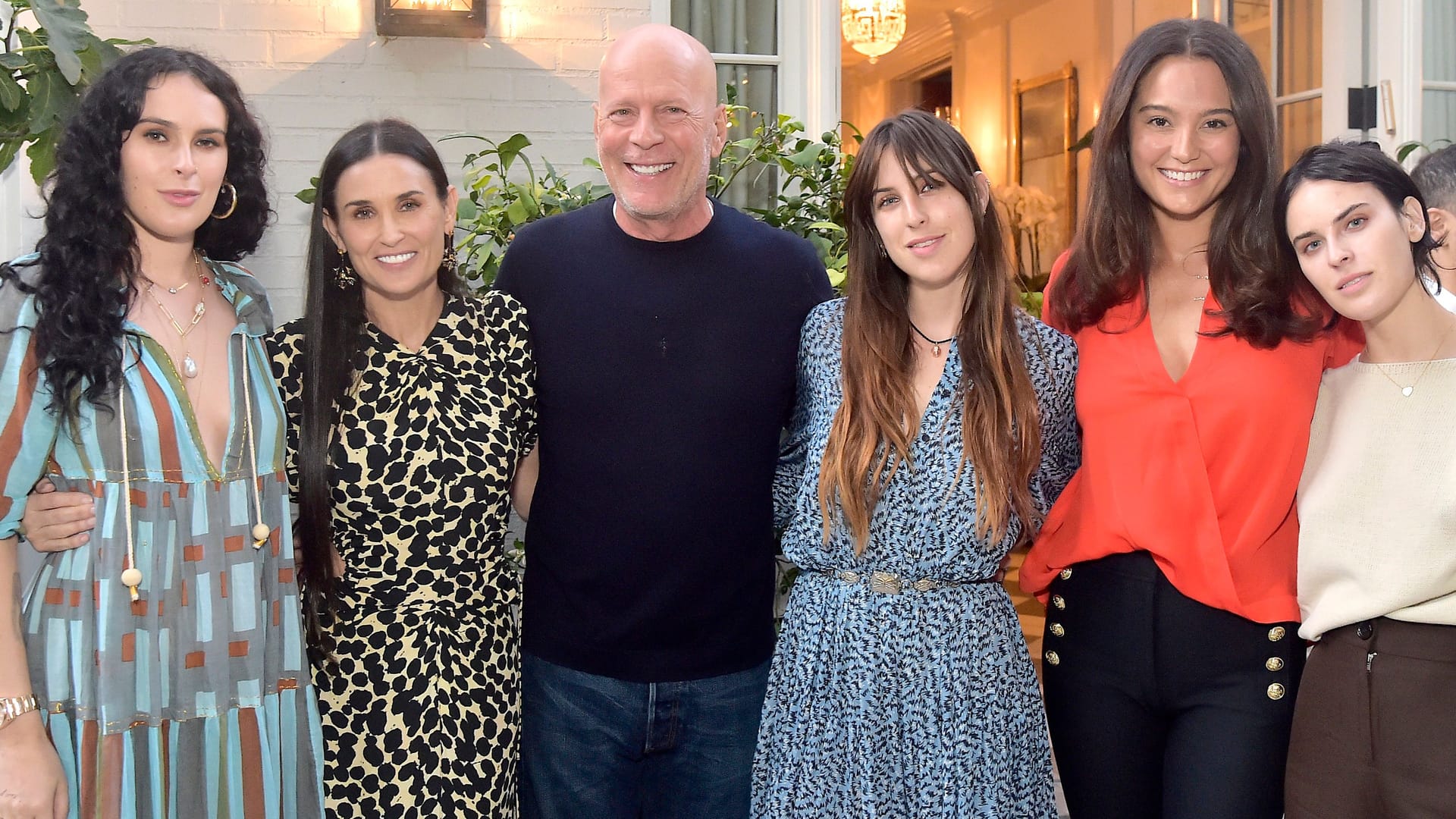The Final Battle of a Hollywood Titan
Bruce Willis’s journey — both on and off screen — has been one defined by strength, resilience, and a quiet dignity. For decades, he captivated audiences worldwide with his unmistakable charisma, dry wit, and larger-than-life screen presence. Yet in recent years, the roles disappeared, the public appearances grew scarce, and behind closed doors, a far more personal and painful story was unfolding.
In 2022, the world first learned of Willis’s diagnosis with aphasia, a condition affecting his ability to communicate. That diagnosis was soon clarified as frontotemporal dementia — a progressive and incurable brain disorder that slowly strips away personality, language, and eventually the ability to function independently.
The man once known for saving hostages in Die Hard, delivering biting monologues in Pulp Fiction, and stunning audiences in The Sixth Sense, was now waging the most human of battles — one against time, memory, and self.

From Global Icon to Private Fighter
As Bruce’s condition advanced, he stepped away from public life. His family — including wife Emma Heming, ex-wife Demi Moore, and his five daughters — became his most vocal advocates and fiercest protectors. They shared carefully chosen updates, never exploiting his suffering, but rather painting a picture of a man loved deeply, cherished quietly, and respected immensely.
The update released this morning, however, struck a heartbreaking chord:
“Bruce is now in hospice care. He is surrounded by love, peace, and the presence of his closest family. These moments are sacred. We appreciate your prayers and support.”
Sources close to the family confirm that Willis no longer speaks, and is largely unresponsive — a far cry from the energetic, sardonic, endlessly expressive actor the world once knew. In his final stage of life, Bruce has become a symbol not only of Hollywood glory, but of the cruel vulnerability that even the strongest among us must eventually face.
A Legacy Far Beyond the Silver Screen
To speak of Bruce Willis only in terms of his illness would be a disservice to the extraordinary legacy he leaves behind.
He wasn’t just an action star — he redefined the genre. John McClane in Die Hard was a revolution: an everyman hero, bruised and bleeding, outmatched but never outwitted. That raw authenticity set a new standard for American cinema, one that made room for grit, humor, and fallibility.
:max_bytes(150000):strip_icc():focal(993x326:995x328)/Demi-Moore-Bruce-Willis-Instagram-031925-2-2135b8d0e2fb44358bb2ceafd1ba3f3c.jpg)
Yet Willis’s range extended far beyond explosions and gunfire. His performances in films like Twelve Monkeys, The Sixth Sense, and Moonrise Kingdom showcased a deeply introspective, vulnerable artist. He could command a scene with a raised eyebrow or a quiet pause. And beneath the bravado, there was always heart — often broken, often searching.
He also ventured into music, releasing several blues albums, and took pride in being a father first, actor second. Unlike many of his peers, Bruce never chased the spotlight. Fame found him — but he never let it define him.
The Family’s Pain — and Their Strength
The Willis family’s response to this tragedy has been nothing short of heroic. In an age of sensationalism, they’ve chosen grace. In the face of grief, they’ve shown unity. Demi Moore, once his wife, now one of his fiercest advocates. Emma Heming, his second wife, has been a tireless caregiver and protector of Bruce’s dignity. Their five daughters — Rumer, Scout, Tallulah, Mabel, and Evelyn — have demonstrated a maturity and strength well beyond their years.
Rumer Willis wrote in an earlier post:
“Watching my father fade has been the most heartbreaking experience of my life. But even as the disease takes his words, it can’t take the love. That’s still there. Always.”
Today’s confirmation of Bruce’s hospice care is more than a medical update — it is the public acknowledgment of the family’s long goodbye. The final chapter is being written in whispers and embraces, not scripts and soundstages.
Hollywood Pays Tribute
Since the announcement, tributes have poured in from across the industry. Director M. Night Shyamalan, who worked with Willis on The Sixth Sense, said:
“Bruce gave me the greatest gift any storyteller could ask for — complete trust. He let his silence speak louder than words.”
Arnold Schwarzenegger called him “a brother in arms,” while Samuel L. Jackson described him as “a true original — tough, funny, tender when it mattered most.”
But perhaps the most telling tribute came from a fan who tweeted simply:
“Bruce Willis made me believe that ordinary people could be heroes. He still does.”
When the Curtain Falls
Hospice is not about prolonging life. It is about preserving dignity. For a man whose career was built on being the last man standing — battered, bloody, but victorious — Bruce’s current reality is sobering. Yet, there is strength in letting go, in embracing the inevitable not with fear, but with love.
We do not yet know how much time remains. But we do know this: Bruce Willis’s light will not dim when the heart monitor beeps for the last time. His legacy is etched in cinema, in music, in family — and in the millions of people whose lives he touched.
A Final Farewell on the Horizon
As the Willis family gathers around him in Texas, they are not just preparing to say goodbye to a father and husband. They are preparing to release a soul who has given everything — on screen, and off. The world watches, prays, and remembers.
Bruce Willis may be nearing the end of his earthly journey, but the echoes of his work, his humor, his heroism — both real and imagined — will remain. Forever.




